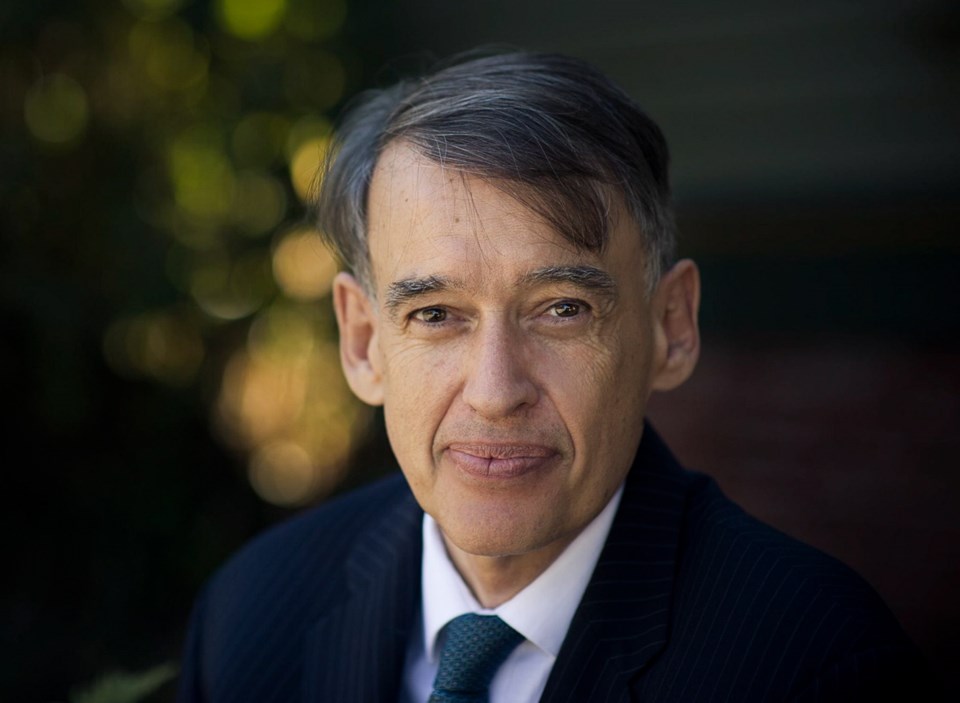Dermod Travis, the executive director of Integrity B.C. who died Monday at the age of 59, is being remembered as the kind of “full-time professional citizen Ralph Nader hoped would help build a more just world.”
“Dermod exposed corruption,” journalism instructor Sean Holman wrote on Twitter. “He exposed wrongdoing. And he did it selflessly, without regard to himself.”
Travis, whose commentaries regularly appeared in newspapers across Canada, including the Times Colonist, had liver disease, and wrote on social media in March that his liver had failed the previous month.
“After some reflection, I will not be adding my name to B.C.’s transplant list,” Travis wrote. “If a suitable liver becomes available and my body is ready for a transplant, there will likely be a far younger person in far greater need … that’ll be your liver.”
Wayne Crookes, founder of the watchdog group, shared the news of Travis’s death on the organization’s website, calling him an outstanding communications and political professional and activist. Crookes said Travis, who died two days prior to what would have been his 60th birthday, tried hard to make Canada and British Columbia a better place.
“I believe very strongly that he made a significant contribution to Canada and to B.C. politics,” Crookes said, adding: “I have lost a very good friend.”
Born in Banff and raised in Victoria, Travis attended the University of British Columbia, worked in Edmonton for the Alberta Liberal Party and spent more than 20 years as a political consultant in Montreal, Crookes said.
He was a strong advocate for electoral-finance reform, campaigning effectively in 2017 to get that issue before voters during the provincial election, he said.
Travis was “orchestrating the issue as if it were a political campaign, which peaked in the final week of the election.”
In early 2004, Crookes became the Green Party of Canada campaign manager and hired Travis as the director of communications and director of media ahead of that year’s federal election.
Within about a month, Travis had pulled together a media team, mainly consisting of young people, he said. “Dermod put them together from his connections in Montreal. He worked out of Montreal during the campaign.”
When the election was called, the team had 100 media releases ready to distribute throughout the campaign, Crookes said.
Crookes paints a picture of Travis’s meticulously crafted approach: “He divided the campaign into five weeks, and the fifth week was devoted to our environmental platform.”
“What he did in that election in such a short time reflected someone with keen insight, great communications and political competence,” he said.
“Certainly, without him, the Green Party would not have done as well.
After he left the Green Party, Travis served as executive director of the Canada-Tibet Committee, where he played a key role in convincing Canada to accept 1,000 Tibetan refugees and their families as immigrants to Canada, Crookes said.
“I was just so impressed with his competence and his industriousness and his volunteerism.”
In 2010, when Travis said he was thinking of returning to B.C., “I suggested that we needed something like Integrity B.C.”
The organization was launched April 1, 2011, with Travis as executive director. Crookes was the founder and sponsor for the organization.
“I think he put the focus of many people, politicians, voters and the media on the importance of financial electoral reform and put the spotlight on some integrity matters for over nine years.”
Brad Slade worked for 21Ú2 years as campaign manager for Travis at Integrity B.C., where they tackled electoral-finance reform.
Slade described his friend as tenacious, highly intelligent and politically savvy.
“He was brilliant. He could find things that no one else could find,” he said. “Dermod was always adamant about making sure he had his facts correct — he would triple- and quadruple-check his facts.”
Slade said Travis had a “heart of gold.”
Travis is survived by sister Deirdre Chettleburgh, who said that even as a child, Dermod was a “grand person.”
At age eight, “he was somehow under the impression he was the assistant manager of the wax museum on Banff Avenue,” where he was a regular visitor, she said fondly. “He was a little bit of an old soul in a little boy’s body.”
The family moved to Victoria in 1968 — father John was a United Church minister and mother Elizabeth was writer. They had a “strong sense of right and wrong and of fairness and justice and were not afraid to ask questions,” Chettleburgh said.
Travis had similar values, was a matter-of-fact person and had a wry sense of humour, his sister said. He would entertain the family with stories about politics. “His whole life was his work.”
Bill Tieleman, a political commentator who worked in communications in the office of the B.C. premier and for the B.C. Federation of Labour, said the work Travis did was important to a lot of people in British Columbia.
“He was a watchdog on government for a long period of time. He held everyone’s feet to the fire with the same zeal. He was very committed to the cause of accountability and responsibility on the part of government. That’s his legacy.”



